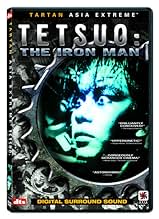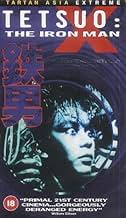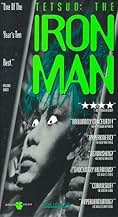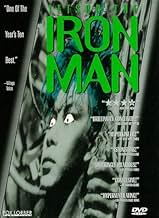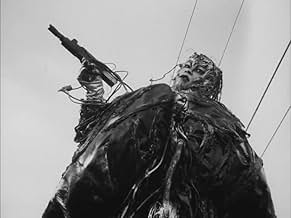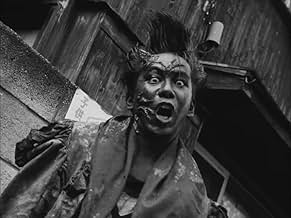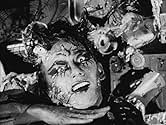AVALIAÇÃO DA IMDb
6,9/10
28 mil
SUA AVALIAÇÃO
Um empresário acidentalmente mata o Fetichista de Metal, que se vinga transformando o homem, lentamente, em um híbrido grotesco de carne e metal enferrujado.Um empresário acidentalmente mata o Fetichista de Metal, que se vinga transformando o homem, lentamente, em um híbrido grotesco de carne e metal enferrujado.Um empresário acidentalmente mata o Fetichista de Metal, que se vinga transformando o homem, lentamente, em um híbrido grotesco de carne e metal enferrujado.
- Prêmios
- 2 vitórias no total
Avaliações em destaque
It's so visually striking that you could never fully describe Tetsuo in words. But here are a few that apply: Japanese, hyperactive, perverse, industrial, surreal, Faustian bargain, contrasty, black-and-white, Kafkaesque, scifi, stop-motion, manga-influenced, revenge, technology, alienation, supervillains.
Shinya Tsukamoto is an actor (he's the antagonistic "Metals Fetishist" here as well as Jijii in Ichi the Killer) as well as a ground-breaking writer/director/cinematographer. Tetsuo's influence can be seen clearly in directors as diverse as Darren Aronofsky, Takashi Miike, and even David Cronenberg.
There is definitely a plot, but due to the non-linear editing and sparsity of dialogue you'll need to pay close attention on a first viewing or else you'll be overwhelmed by the engrossing visual style (which might be a good thing). It's filmed in contrasty black-and-white. Each frame is cramped and chaotic, much of the time it's filled with wires, pipes, chain-link fences, and all the other incidental debris of life in the late 20th century... which suddenly seems significant and even menacing.
Towards the fifty-minute mark (it's 67 min. total) the willful excess starts to feel a little too excessive, perhaps the manga influence is a bit too strong. But Tetsuo finishes strong, with an end that's at once unexpected and inevitable. Highly recommended.
Shinya Tsukamoto is an actor (he's the antagonistic "Metals Fetishist" here as well as Jijii in Ichi the Killer) as well as a ground-breaking writer/director/cinematographer. Tetsuo's influence can be seen clearly in directors as diverse as Darren Aronofsky, Takashi Miike, and even David Cronenberg.
There is definitely a plot, but due to the non-linear editing and sparsity of dialogue you'll need to pay close attention on a first viewing or else you'll be overwhelmed by the engrossing visual style (which might be a good thing). It's filmed in contrasty black-and-white. Each frame is cramped and chaotic, much of the time it's filled with wires, pipes, chain-link fences, and all the other incidental debris of life in the late 20th century... which suddenly seems significant and even menacing.
Towards the fifty-minute mark (it's 67 min. total) the willful excess starts to feel a little too excessive, perhaps the manga influence is a bit too strong. But Tetsuo finishes strong, with an end that's at once unexpected and inevitable. Highly recommended.
Japan is a crazy country. Their workaholism is affecting western culture all the time. Coming to Tokyo first time, one can get lost not only in translation, hehe, but mostly in all these technological gadgets that leave you with only three questions: "what the hell is this for?", "what the hell is that for?", and "how the hell does it work?". On one side, coming to Japan, one might see something very rare today: amazing technology next to tradition, remains of culture hundreds and thousands years old. But on the other, Japanese does seem to have a lot of fear about all that technology. Won't that materialistic, technological approach kill emotional and spiritual aspects of human existence? There has been made a lot of movies asking that question, projecting hypothetical versions of future based on what Japan looks like today. See Ghost in the Shell for example. Yeah, alright, but what does Tetsuo have to do with all that crap? Everything. This Tsukamoto piece of art is a manifestation of great great fear of cold and soulless technology. Main character is a guy who has rather serious problem: one day he notices that metal parts are slowly beginning to reveal themselves from under his skin. Why, and what does it mean? Where will it lead to? You'll see. What I can say is that you don't need to live in Japan to enjoy this movie. The atmosphere is amazingly unconventional, and can be compared only to other industrial/anti-industrial masterpieces of Japanese cinema. The movie is black and white only all the time. Camera work is incredible, it builds intense paranoid atmosphere. If you've seen other Shinya's movies, you know what you can expect. The way the story is told, with all these cut-and-paste elements... oh God :D If you've already seen some totally psyched-out movies like this one, you might get a laugh sometimes, otherwise I guarantee you'll be strongly shocked, because as I said before: you probably haven't seen anything like this before, so watch your back, you have been warned ;) Budget used to make this movie may be equal to something like two cokes and a hamburger, but, as we can see, some don't waste even that small amount of money. There are movies made with a little help of millions of dollars which are not even worth a cent. On the other side, there are gems like this, where you can't notice signs of low-budget, because it doesn't harm this movie even in one moment. I can't think of one thing I'd change in this movie. Highly recommended, this one is a blast!
PS. If you're willing to get some other Tsukamoto movies, avoid Hiruko the Goblin.
PS. If you're willing to get some other Tsukamoto movies, avoid Hiruko the Goblin.
This movie can be explored in many ways: the relationship between human life and technology is the first which comes to mind. Then maybe this fits into a larger theme of industrialization. Still, there are several ways of interpreting each scene and at times I had the feeling that they try to show - or to produce a metaphor for - human emotions, such as cheating, sorrow, the will not to die alone. "And we can rust the whole world and scatter it into the dust of universe" You will certainly make what you want of this movie. You may understand that technology is evil, that industrialization takes our souls away, or that even in our worst moments we crave for closeness and we don't want to be alone. This is a special movie - so beware - it is not accessible to most people. There's a chance that you won't be able to think for yourself and that you'll expect some quick & nice Hollywood conclusions which you're not going to get - in which case, this movie will be a waste of your time.
I can honestly say that this is the strangest movie I have ever seen. It is not bad, just really weird. There doesn't seem to be any other way to describe it well. It's also very easy to get lost in it. Crazy camera action. Crazy things. Crazy people. WEIRD!
Tetsuo is, perhaps, the most brilliant film I have ever had the pleasure of witnessing. I feel that most viewers are not mature enough/experienced with extreme cinema to look beneath the superficial "story," of which there is very little, to appreciate the wealth of subtext lurking beneath the most mind-blowing and exhilarating hour and seven minutes ever committed to film.
At once, it is an allegory of technology in the modern age (and the dehumanizing effect it has on its unwitting victims), a commentary on the psycho-sexual fetishization of industrialization, a critique of vengeance and violence, a celebration of nihilism and the potential beauty of destruction, a deranged superhero fantasy, a metaphor for failed dreams, an indictment of sexual repression (including homosexuality) and, at its core, a modern day ghost story, in which a hit and run driver (of sorts; he does carelessly dump the metal fetishist's body in the woods) is haunted by his metal-obsessed, ambiguously homosexual, marathon runner victim, a crazed nihilist who has acquired the ability to manipulate metal with his mind after a piece of steel (from the car) became lodged in his brain during the accident. In this modern age, the fear of the afterlife and the spirit has been replaced with that of technology gone haywire, the fear of weapons falling into in the "wrong" hands and of a human creation rising up to overcome, overpower and, ultimately, destroy the humans responsible for it. The events of the film, when taken to be no more than the actual images depicted, are too disturbing, complex and, ultimately, too alien, for the average, unthinking audience member to make heads or tails of, and thus are insulted as pointless, "offensive" and "weird," as if these highly subjective concepts denote something inherent in the movie. If you are one who can handle complex films with fairly simple story lines told in a completely non-linear fashion (what we actual artists/filmmakers call USING THE ART FORM!), then, please, do yourself a favor and buy this film immediately! You will gain something new from it each time you view it (I have seen it over thirty times and am still learning!). If you, however, are unable to read (and read into) images (the currency with which the medium of film traffics), and are unable to handle "weird" things without being spoonfed clear cut "heros" and "villains," then rent/buy "Titanic" and leave complex films to the thinkers and artists and revel in your own ignorance, but do not put down Shinya Tsukamoto, a man who has won my undying respect with ONE film.
At once, it is an allegory of technology in the modern age (and the dehumanizing effect it has on its unwitting victims), a commentary on the psycho-sexual fetishization of industrialization, a critique of vengeance and violence, a celebration of nihilism and the potential beauty of destruction, a deranged superhero fantasy, a metaphor for failed dreams, an indictment of sexual repression (including homosexuality) and, at its core, a modern day ghost story, in which a hit and run driver (of sorts; he does carelessly dump the metal fetishist's body in the woods) is haunted by his metal-obsessed, ambiguously homosexual, marathon runner victim, a crazed nihilist who has acquired the ability to manipulate metal with his mind after a piece of steel (from the car) became lodged in his brain during the accident. In this modern age, the fear of the afterlife and the spirit has been replaced with that of technology gone haywire, the fear of weapons falling into in the "wrong" hands and of a human creation rising up to overcome, overpower and, ultimately, destroy the humans responsible for it. The events of the film, when taken to be no more than the actual images depicted, are too disturbing, complex and, ultimately, too alien, for the average, unthinking audience member to make heads or tails of, and thus are insulted as pointless, "offensive" and "weird," as if these highly subjective concepts denote something inherent in the movie. If you are one who can handle complex films with fairly simple story lines told in a completely non-linear fashion (what we actual artists/filmmakers call USING THE ART FORM!), then, please, do yourself a favor and buy this film immediately! You will gain something new from it each time you view it (I have seen it over thirty times and am still learning!). If you, however, are unable to read (and read into) images (the currency with which the medium of film traffics), and are unable to handle "weird" things without being spoonfed clear cut "heros" and "villains," then rent/buy "Titanic" and leave complex films to the thinkers and artists and revel in your own ignorance, but do not put down Shinya Tsukamoto, a man who has won my undying respect with ONE film.
Você sabia?
- CuriosidadesThe film was based on a play that Shin'ya Tsukamoto had written, directed and performed in college.
- Citações
Metals Fetishist: Together, we can turn this fucking world to rust!
- Cenas durante ou pós-créditos(after end credits) GAME OVER
- Versões alternativasTetsuo The First Cut is an extended version released on DVD, running 10 minutes longer than the original 67 minute running time.
- ConexõesEdited into Gli ultimi giorni dell'umanità (2022)
Principais escolhas
Faça login para avaliar e ver a lista de recomendações personalizadas
Detalhes
- Data de lançamento
- País de origem
- Idioma
- Também conhecido como
- Tetsuo: el hombre de hierro
- Empresas de produção
- Consulte mais créditos da empresa na IMDbPro
- Tempo de duração
- 1 h 7 min(67 min)
- Cor
- Proporção
- 1.37 : 1
Contribua para esta página
Sugerir uma alteração ou adicionar conteúdo ausente

